formerly eScholarship Editions


|
|
|
|
Your request for similar items found 20 book(s). | Modify Search | Displaying 1 - 20 of 20 book(s) | |
| 1. | 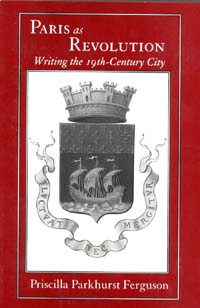 | Title: Paris as revolution: writing in the nineteenth-century city Author: Ferguson, Priscilla Parkhurst Published: University of California Press, 1997 Subjects: Literature | Social Theory | European Literature | Literary Theory and Criticism | European History | French Studies Publisher's Description: In nineteenth-century Paris, passionate involvement with revolution turned the city into an engrossing object of cultural speculation. For writers caught between an explosive past and a bewildering future, revolution offered a virtuoso metaphor by which the city could be known and a vital principle through which it could be portrayed.In this engaging book, Priscilla Ferguson locates the originality and modernity of nineteenth-century French literature in the intersection of the city with revolution. A cultural geography, Paris as Revolution "reads" the nineteenth-century city not in literary works alone but across a broad spectrum of urban icons and narratives. Ferguson moves easily between literary and cultural history and between semiotic and sociological analysis to underscore the movement and change that fueled the powerful narratives defining the century, the city, and their literature. In her understanding and reconstruction of the guidebooks of Mercier, Hugo, Vallès, and others, alongside the novels of Flaubert, Hugo, Vallès, and Zola, Ferguson reveals that these works are themselves revolutionary performances, ones that challenged the modernizing city even as they transcribed its emergence. [brief] Similar Items |
| 2. | 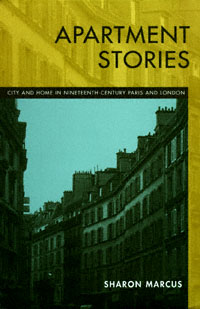 | Title: Apartment stories: city and home in nineteenth-century Paris and London Author: Marcus, Sharon 1966- Published: University of California Press, 1999 Subjects: Literature | European History | Urban Studies | Women's Studies Publisher's Description: In urban studies, the nineteenth century is the "age of great cities." In feminist studies, it is the era of the separate domestic sphere. But what of the city's homes? In the course of answering this question, Apartment Stories provides a singular and radically new framework for understanding the urban and the domestic. Turning to an element of the cityscape that is thoroughly familiar yet frequently overlooked, Sharon Marcus argues that the apartment house embodied the intersections of city and home, public and private, and masculine and feminine spheres.Moving deftly from novels to architectural treatises, legal debates, and popular urban observation, Marcus compares the representation of the apartment house in Paris and London. Along the way, she excavates the urban ghost tales that encoded Londoners' ambivalence about city dwellings; contends that Haussmannization enclosed Paris in a new regime of privacy; and locates a female counterpart to the flâneur and the omniscient realist narrator - the portière who supervised the apartment building. [brief] Similar Items |
| 3. | 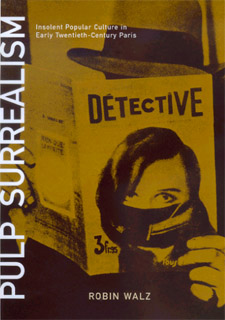 | Title: Pulp surrealism: insolent popular culture in early twentieth-century Paris Author: Walz, Robin 1957- Published: University of California Press, 2000 Subjects: History | French Studies | Comparative Literature Publisher's Description: In addition to its more well known literary and artistic origins, the French surrealist movement drew inspiration from currents of psychological anxiety and rebellion running through a shadowy side of mass culture, specifically in fantastic popular fiction and sensationalistic journalism. The provocative nature of this insolent mass culture resonated with the intellectual and political preoccupations of the surrealists, as Robin Walz demonstrates in this fascinating study. Pulp Surrealism weaves an interpretative history of the intersection between mass print culture and surrealism, re-evaluating both our understanding of mass culture in early twentieth-century Paris and the revolutionary aims of the surrealist movement. Pulp Surrealism presents four case studies, each exploring the out-of the-way and impertinent elements which inspired the surrealists. Walz discusses Louis Aragon's Le paysan de Paris, one of the great surrealist novels of Paris. He goes on to consider the popular series of Fantômes crime novels; the Parisan press coverage of the arrest, trial, and execution of mass-murderer Landru; and the surrealist inquiry "Is Suicide a Solution?", which Walz juxtaposes with reprints of actual suicide faits divers (sensationalist newspaper blurbs). Although surrealist interest in sensationalist popular culture eventually waned, this exploration of mass print culture as one of the cultural milieux from which surrealism emerged ultimately calls into question assumptions about the avant-garde origins of modernism itself. [brief] Similar Items |
| 4. | 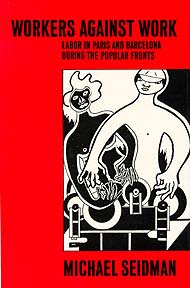 | Title: Workers against work: labor in Paris and Barcelona during the popular fronts Author: Seidman, Michael (Michael M.) Published: University of California Press, 1990 Subjects: History | European History | Social Science | French Studies | Labor Studies Publisher's Description: Why did a revolution occur in Spain and not in France in 1936? This is the key question Michael Seidman explores in his important new study of the relations between industrial capitalists and working-class movements in the early part of this century. In a comparative analysis of Paris during the Popular Front and Barcelona during the Spanish Revolution, Seidman examines the strengths and weaknesses of the bourgeoisie in these two cities and traces workers' resistance to, and acceptance of, work. His emphasis on the continuing refusal to work challenges the dominant views of labor historiography and contributes to a general theory of revolutionary workers' control.Seidman illuminates three crucial issues that have broad implications for the history of the twentieth century. His comparative approach delineates the nature of class confrontation in societies with different kinds of bourgeoisies or capitalist elites. He also shows how the differences between these elites affected the labor movements in France and Spain, and he demonstrates how rank-and-file workers actually responded to the revolutionary situation in Barcelona and to the advent of the reformist government in Paris.A social history of acceptance and rejection of work, this book offers a new conceptualization of wage earners and a critique of work itself. [brief] Similar Items |
| 5. | 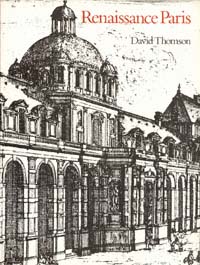 | Title: Renaissance Paris: architecture and growth, 1475-1600 Author: Thomson, David 1912- Published: University of California Press, 1985 Subjects: Art | Architecture Publisher's Description: In the modern literature on Renaissance art and architecture, Paris has often been considered the Cinderella of the European capitals. The prestigious buildings that were erected soon after François I decided in 1528 to make Paris his residence have long since been lost. Thomson, however, restores t . . . [more] Similar Items |
| 6. | 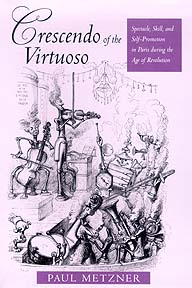 | Title: Crescendo of the virtuoso: spectacle, skill, and self-promotion in Paris during the Age of Revolution Author: Metzner, Paul 1952- Published: University of California Press, 1998 Subjects: History | European History | French Studies | European Studies Publisher's Description: During the Age of Revolution, Paris came alive with wildly popular virtuoso performances. Whether the performers were musicians or chefs, chess players or detectives, these virtuosos transformed their technical skills into dramatic spectacles, presenting the marvelous and the outré for spellbound audiences. Who these characters were, how they attained their fame, and why Paris became the focal point of their activities is the subject of Paul Metzner's absorbing study. Covering the years 1775 to 1850, Metzner describes the careers of a handful of virtuosos: chess masters who played several games at once; a chef who sculpted hundreds of four-foot-tall architectural fantasies in sugar; the first police detective, whose memoirs inspired the invention of the detective story; a violinist who played whole pieces on a single string. He examines these virtuosos as a group in the context of the society that was then the capital of Western civilization. [brief] Similar Items |
| 7. | 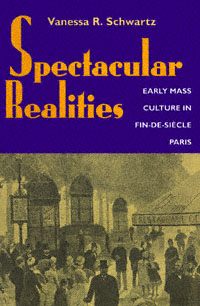 | Title: Spectacular realities: early mass culture in fin-de-siècle Paris Author: Schwartz, Vanessa R Published: University of California Press, 1998 Subjects: History | French Studies | European History | European Literature | Women's Studies | Film Publisher's Description: During the second half of the nineteenth century, Paris emerged as the entertainment capital of the world. The sparkling redesigned city fostered a culture of energetic crowd-pleasing and multi-sensory amusements that would apprehend and represent real life as spectacle.Vanessa R. Schwartz examines the explosive popularity of such phenomena as the boulevards, the mass press, public displays of corpses at the morgue, wax museums, panoramas, and early film. Drawing on a wide range of written and visual materials, including private and business archives, and working at the intersections of art history, literature, and cinema studies, Schwartz argues that "spectacular realities" are part of the foundation of modern mass society. She refutes the notion that modern life produced an unending parade of distractions leading to alienation, and instead suggests that crowds gathered not as dislocated spectators but as members of a new kind of crowd, one united in pleasure rather than protest. [brief] Similar Items |
| 8. | 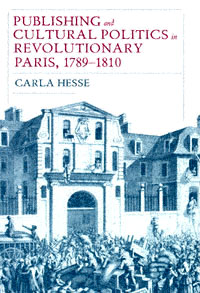 | Title: Publishing and cultural politics in revolutionary Paris, 1789-1810 Author: Hesse, Carla Published: University of California Press, 1991 Subjects: History | European History | Print Media | French Studies Publisher's Description: In 1789 French revolutionaries initiated a cultural experiment that radically transformed the most basic elements of French literary civilization - authorship, printing, and publishing. In a panoramic analysis, Carla Hesse tells how the Revolution shook the Parisian printing and publishing world from top to bottom, liberating the trade from absolutist institutions and inaugurating a free-market exchange of ideas.Historians and literary critics have traditionally viewed the French Revolution as a catastrophe for French literary culture. Combing through extensive new archival sources, Hesse finds instead that revolutionaries intentionally dismantled the elite literary civilization of the Old Regime to create unprecedented access to the printed word. Exploring the uncharted terrains of popular fiction, authors' rights, and literary life under the Terror, Carla Hesse offers a new perspective on the relationship between democratic revolutions and modern cultural life. [brief] Similar Items |
| 9. | 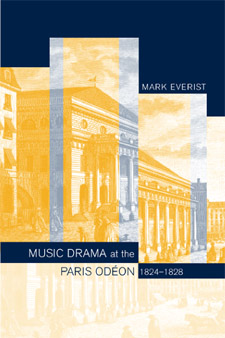 | Title: Music drama at the Paris Odéon, 1824-1828 Author: Everist, Mark Published: University of California Press, 2002 Subjects: Music | Musicology | Opera | French Studies | European History Publisher's Description: Parisian theatrical, artistic, social, and political life comes alive in Mark Everist's impressive institutional history of the Paris Odéon, an opera house that flourished during the Bourbon Restoration. Everist traces the complete arc of the Odéon's short but highly successful life from ascent to triumph, decline, and closure. He outlines the role it played in expanding operatic repertoire and in changing the face of musical life in Paris. Everist reconstructs the political power structures that controlled the world of Parisian music drama, the internal administration of the theater, and its relationship with composers and librettists, and with the city of Paris itself. His rich depiction of French cultural life and the artistic contexts that allowed the Odéon to flourish highlights the benefit of close and innovative examination of society's institutions. [brief] Similar Items |
| 10. | 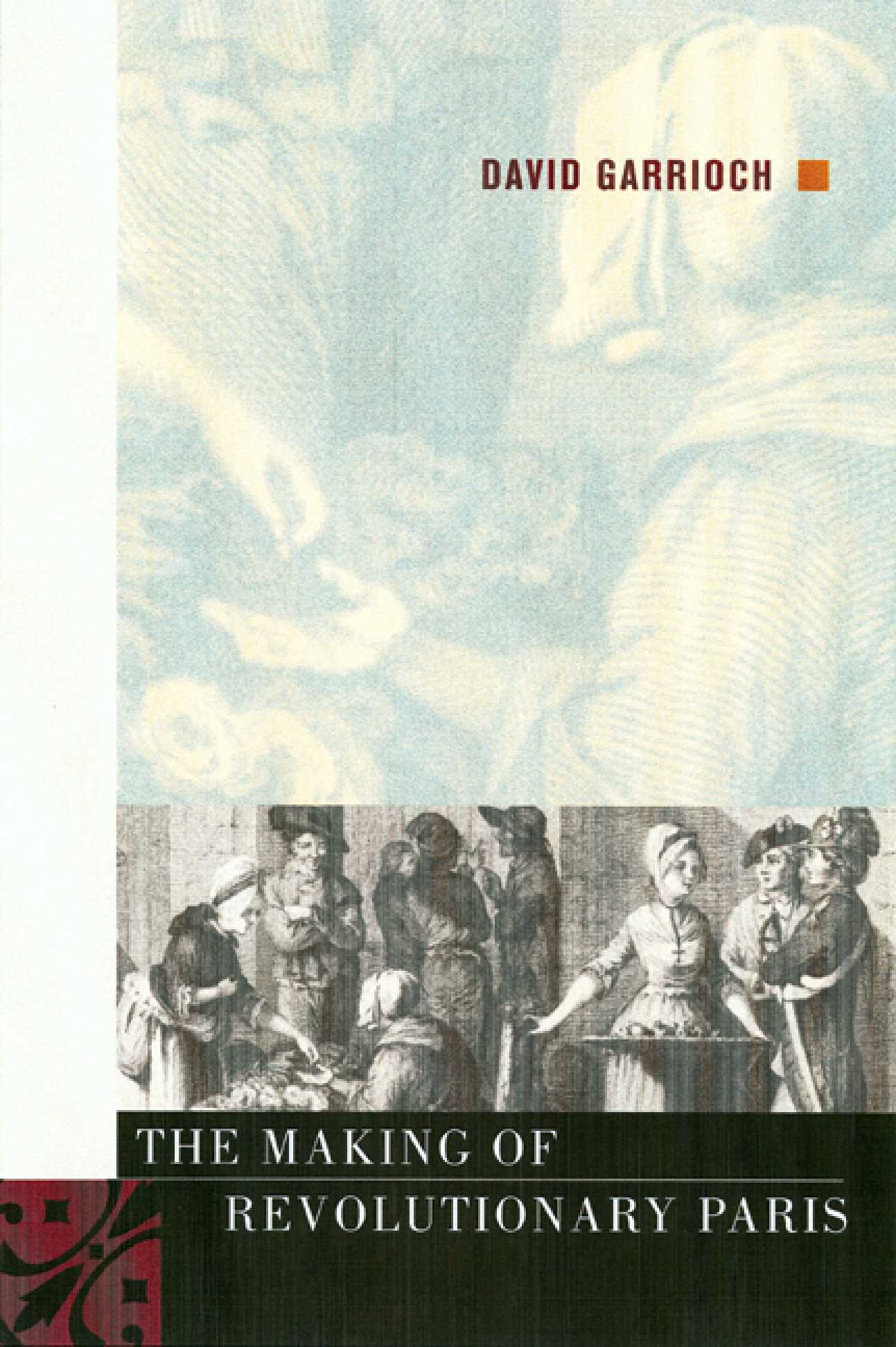 | Title: The making of revolutionary Paris Author: Garrioch, David Published: University of California Press, 2002 Subjects: History | European History | European Studies | French Studies Publisher's Description: The sights, sounds, and smells of life on the streets and in the houses of eighteenth-century Paris rise from the pages of this marvelously anecdotal chronicle of a perpetually alluring city during one hundred years of extraordinary social and cultural change. An excellent general history as well as an innovative synthesis of new research, The Making of Revolutionary Paris combines vivid portraits of individual lives, accounts of social trends, and analyses of significant events as it explores the evolution of Parisian society during the eighteenth century and reveals the city's pivotal role in shaping the French Revolution. David Garrioch rewrites the origins of the Parisian Revolution as the story of an urban metamorphosis stimulated by factors such as the spread of the Enlightenment, the growth of consumerism, and new ideas about urban space. With an eye on the broad social trends emerging during the century, he focuses his narrative on such humble but fascinating aspects of daily life as traffic congestion, a controversy over the renumbering of houses, and the ever-present dilemma of where to bury the dead. He describes changes in family life and women's social status, in religion, in the literary imagination, and in politics. Paris played a significant role in sparking the French Revolution, and in turn, the Revolution changed the city, not only its political structures but also its social organization, gender ideologies, and cultural practices. This book is the first to look comprehensively at the effect of the Revolution on city life. Based on the author's own research in Paris and on the most current scholarship, this absorbing book takes French history in new directions, providing a new understanding of the Parisian and the European past. [brief] Similar Items |
| 11. | 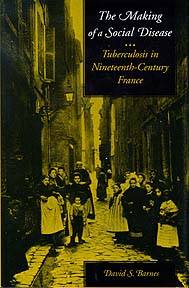 | Title: The making of a social disease;: tuberculosis in nineteenth-century France Author: Barnes, David S Published: University of California Press, 1995 Subjects: History | History and Philosophy of Science | Medicine | European History Publisher's Description: In this first English-language study of popular and scientific responses to tuberculosis in nineteenth-century France, David Barnes provides a much-needed historical perspective on a disease that is making an alarming comeback in the United States and Europe. Barnes argues that French perceptions of the disease - ranging from the early romantic image of a consumptive woman to the later view of a scourge spread by the poor - owed more to the power structures of nineteenth-century society than to medical science. By 1900, the war against tuberculosis had become a war against the dirty habits of the working class.Lucid and original, Barnes's study broadens our understanding of how and why societies assign moral meanings to deadly diseases. [brief] Similar Items |
| 12. | 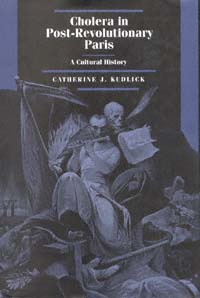 | Title: Cholera in post-revolutionary Paris: a cultural history Author: Kudlick, Catherine Jean Published: University of California Press, 1996 Subjects: History | European History | Medicine Publisher's Description: Cholera terrified and fascinated nineteenth-century Europeans more than any other modern disease. Its symptoms were gruesome, its sources were mysterious, and it tended to strike poor neighborhoods hardest. In this insightful cultural history, Catherine Kudlick explores the dynamics of class relations through an investigation of the responses to two cholera epidemics in Paris.While Paris climbed toward the height of its urban and industrial growth, two outbreaks of the disease ravaged the capital, one in 1832, the other in 1849. Despite the similarity of the epidemics, the first outbreak was met with general frenzy and far greater attention in the press, popular literature and personal accounts, while the second was greeted with relative silence. Finding no compelling evidence for improved medical knowledge, changes in the Paris environment, or desensitization of Parisians, Kudlick looks to the evolution of the French revolutionary tradition and the emergence of the Parisian bourgeoisie for answers. [brief] Similar Items |
| 13. |  | Title: Inheriting madness: professionalization and psychiatric knowledge in nineteenth-century France Author: Dowbiggin, Ian R Published: University of California Press, 1991 Subjects: History | European History | Sociology | Psychiatry Publisher's Description: Historically, one of the recurring arguments in psychiatry has been that heredity is the root cause of mental illness. In Inheriting Madness , Ian Dowbiggin traces the rise in popularity of hereditarianism in France during the second half of the nineteenth century to illuminate the nature and evolution of psychiatry during this period.In Dowbiggin's mind, this fondness for hereditarianism stemmed from the need to reconcile two counteracting factors. On the one hand, psychiatrists were attempting to expand their power and privileges by excluding other groups from the treatment of the mentally ill. On the other hand, medicine's failure to effectively diagnose, cure, and understand the causes of madness made it extremely difficult for psychiatrists to justify such an expansion. These two factors, Dowbiggin argues, shaped the way psychiatrists thought about insanity, encouraging them to adopt hereditarian ideas, such as the degeneracy theory, to explain why psychiatry had failed to meet expectations. Hereditarian theories, in turn, provided evidence of the need for psychiatrists to assume more authority, resources, and cultural influence. Inheriting Madness is a forceful reminder that psychiatric notions are deeply rooted in the social, political, and cultural history of the profession itself. At a time when genetic interpretations of mental disease are again in vogue, Dowbiggin demonstrates that these views are far from unprecedented, and that in fact they share remarkable similarities with earlier theories. A familiarity with the history of the psychiatric profession compels the author to ask whether or not public faith in it is warranted. [brief] Similar Items |
| 14. |  | Title: The rise of the Paris red belt Author: Stovall, Tyler Edward Published: University of California Press, 1990 Subjects: History | European History | Social Science | French Studies Publisher's Description: From 1920 until the present, the working-class suburbs of Paris, known as the Red Belt, have constituted the heart of French Communism, providing the Party not only with its most solid electoral base but with much of its cultural identity as well. Focusing on the northeastern suburb of Bobigny, Stovall explores the nature of working-class life and politicization as he skillfully documents how this unique region and political culture came into being. The Rise of the Paris Red Belt reveals that the very process of urban development in metropolitan Paris and the suburbs provided the most important opportunities for the local establishment of Communist influence.The rapid increase in Paris' suburban population during the early twentieth century outstripped the development of the local urban infrastructure. Consequently, many of these suburbs, often represented to their new residents as charming country villages, soon degenerated into suburban slums. Stovall argues that Communists forged a powerful political block by mobilizing the disillusionment and by improving some of the worst aspects of suburban life.As a social history of twentieth-century France, The Rise of the Paris Red Belt calls into question traditional assumptions about the history of both French Communism and the French working-class. It suggests that those interested in working-class politics, especially in the twentieth century, should consider the significance of residential and consumer issues as well as those relating to the workplace. It also suggests that urban history and urban development should not be considered autonomous phenomena, but rather expressions of class relations. The Rise of the Paris Red Belt brings to life a world whose citizens, though often overlooked, are nonetheless the history of modern France. [brief] Similar Items |
| 15. | 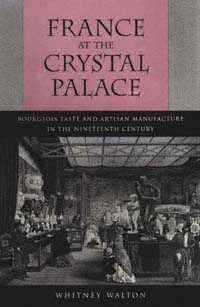 | Title: France at the Crystal Palace: bourgeois taste and artisan manufacture in the nineteenth century Author: Walton, Whitney Published: University of California Press, 1992 Subjects: History | European History | Women's Studies | French Studies Publisher's Description: Whitney Walton approaches the nineteenth-century French industrial development from a new perspective - that of consumption. She analyzes the French performance at the Crystal Palace Exhibition of 1851 to illustrate how bourgeois consumers influenced France's distinctive pattern of industrial development. She also demonstrates the importance of consumption and gender in class formation and reveals how women influenced industry in their role as consumers.Walton examines important consumer goods industries that have been rarely studied by historians, such as the manufacture of wallpaper, furniture, and bronze statues. Using archival sources on household possessions of the Parisian bourgeoisie as well as published works, she shows how consumers' taste for fashionable, artistic, well-made furnishings and apparel promoted a specialization unique to nineteenth-century France. [brief] Similar Items |
| 16. | 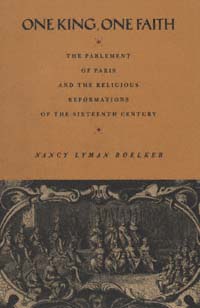 | Title: One king, one faith: the Parlement of Paris and the religious reformations of the sixteenth century Author: Roelker, Nancy L. (Nancy Lyman) Published: University of California Press, 1996 Subjects: History | European History | Christianity | European Studies | French Studies Publisher's Description: This book, the culmination of a lifelong career in French history, tackles head-on the central question of the French Religious Wars: Why did France prove so consistently hostile and resistant to Protestantism? Distinguished scholar Nancy Lyman Roelker claims that what ultimately motivated the passion and violence of the civil wars was religion. She demonstrates that not only the body politic but also the body social was defined by Gallican Catholicism.Roelker underscores the role the Parlement played in shaping and safeguarding the social, as well as the political, order. Her study is based on extensive research in the correspondence, memoirs, and tracts of mainstream Catholic magistrates as well as dissenters. It creates an overview of the mentalitè s of the Parlement, analyzes religious attitudes toward major events of the period, and examines the Parlement's role in the triumph of Henri IV. Along the way, it sheds light on the inner workings of the Parlement and other political institutions, on social structures, and on collective ideas. And above all, this distinguished work brilliantly illuminates the role of religion in society and the state. It will be the definitive work on the subject for many years to come. [brief] Similar Items |
| 17. | 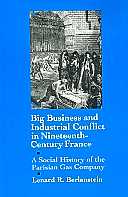 | Title: Big business and industrial conflict in nineteenth-century France: a social history of the Parisian Gas Company Author: Berlanstein, Lenard R Published: University of California Press, 1991 Subjects: History | European History | French Studies | Economics and Business | Technology and Society Publisher's Description: Founded in 1855, the Parisian Gas Company (PGC) quickly developed into one of France's greatest industrial enterprises, an exemplar of the new industrial capitalism that was beginning to transform the French economy. The PGC supplied at least half the coal gas consumed in France through the 1870s and became the city's single largest employer of clerical and factory labor. Representing a new form and scale of capitalistic endeavor, the firm's history illuminates the social tensions that accompanied the nation's industrialization and democratization.To study the company over its fifty-year life is to see industrializing France writ small. Using previously untapped company archives, Lenard R. Berlanstein has written a rich and detailed study that skillfully bridges the divide between business, social, and labor history. [brief] Similar Items |
| 18. | 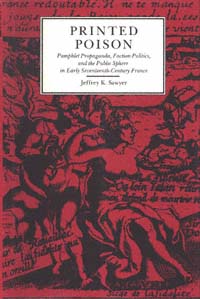 | Title: Printed poison: pamphlet propaganda, faction politics, and the public sphere in early Seventeenth-century France Author: Sawyer, Jeffrey K Published: University of California Press, 1991 Subjects: History | European History | Print Media | Politics | French Studies Publisher's Description: Combining a broad analysis of political culture with a particular focus on rhetoric and strategy, Jeffrey Sawyer analyzes the role of pamphlets in the political arena in seventeenth-century France. During the years 1614-1617 a series of conflicts occurred in France, resulting from the struggle for domination of Louis XIII's government. In response more than 1200 pamphlets - some printed in as many as eighteen editions - were produced and distributed. These pamphlets constituted the political press of the period, offering the only significant published source of news and commentary.Sawyer examines key aspects of the impact of pamphleteering: the composition of the targeted public and the ways in which pamphlets were designed to affect its various segments, the interaction of pamphlet printing and political action at the court and provincial levels, and the strong connection between pamphlet content and assumptions on the one hand and the evolution of the French state on the other. His analysis provides new and valuable insights into the rhetoric and practice of politics.Sawyer concludes that French political culture was shaped by the efforts of royal ministers to control political communication. The resulting distortions of public discourse facilitated a spectacular growth of royal power and monarchist ideology and influenced the subsequent history of French politics well into the Revolutionary era. [brief] Similar Items |
| 19. | 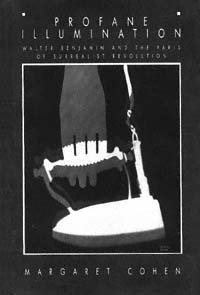 | Title: Profane illumination: Walter Benjamin and the Paris of surrealist revolution Author: Cohen, Margaret Published: University of California Press, 1993 Subjects: German Studies | Philosophy | Literary Theory and Criticism Publisher's Description: Margaret Cohen's encounter with Walter Benjamin, one of the twentieth century's most influential cultural and literary critics, has produced a radically new reading of surrealist thought and practice. Cohen analyzes the links between Breton's surrealist fusion of psychoanalysis and Marxism and Benjamin's post-Enlightenment challenge to Marxist theory. She argues that Breton's surrealist Marxism played a formative role in shaping postwar French intellectual life and is of continued relevance to the contemporary intellectual scene. [brief] Similar Items |
| 20. | 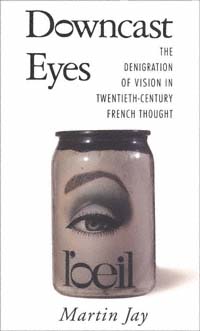 | Title: Downcast eyes: the denigration of vision in twentieth-century French thought Author: Jay, Martin 1944- Published: University of California Press, 1993 Subjects: Philosophy | Intellectual History | French Studies | Literary Theory and Criticism | Art Theory Publisher's Description: Long considered "the noblest of the senses," vision has increasingly come under critical scrutiny by a wide range of thinkers who question its dominance in Western culture. These critics of vision, especially prominent in twentieth-century France, have challenged its allegedly superior capacity to provide access to the world. They have also criticized its supposed complicity with political and social oppression through the promulgation of spectacle and surveillance.Martin Jay turns to this discourse surrounding vision and explores its often contradictory implications in the work of such influential figures as Jean-Paul Sartre, Maurice Merleau-Ponty, Michel Foucault, Jacques Lacan, Louis Althusser, Guy Debord, Luce Irigaray, Emmanuel Levinas, and Jacques Derrida. Jay begins with a discussion of the theory of vision from Plato to Descartes, then considers its role in the French Enlightenment before turning to its status in the culture of modernity. From consideration of French Impressionism to analysis of Georges Bataille and the Surrealists, Roland Barthes's writings on photography, and the film theory of Christian Metz, Jay provides lucid and fair-minded accounts of thinkers and ideas widely known for their difficulty.His book examines the myriad links between the interrogation of vision and the pervasive antihumanist, antimodernist, and counter-enlightenment tenor of much recent French thought. Refusing, however, to defend the dominant visual order, he calls instead for a plurality of "scopic regimes." Certain to generate controversy and discussion throughout the humanities and social sciences, Downcast Eyes will consolidate Jay's reputation as one of today's premier cultural and intellectual historians. [brief] Similar Items |